- Home
- Joan Lowery Nixon
Haunted Island
Haunted Island Read online
HAUNTED ISLAND
Joan Lowery Nixon
Contents
1
2
3
4
5
6
7
8
9
10
11
12
13
14
1
CHRIS HOLT LEANED ON the railing of the wide porch that stretched across the length of his Aunt Jennie’s Island View Inn. He stared at the carpenter who stood below him, talking to Aunt Jennie.
The man tugged at a strap on his bib overalls and twisted his shoulders as though he’d like to squirm out of what he had to say. “Nobody’s going to work on your island, ma’am. Not a man in these parts is willing to set foot on the place.”
Amy, Chris’s twelve-year-old sister, tiptoed to the rail and nudged his arm. “You shouldn’t be listening to someone else’s conversation,” she whispered.
“Go away,” Chris whispered back, missing whatever Aunt Jennie had said to the carpenter.
“Just because you’re a year older than me—” Amy began, but Chris interrupted her.
“They’re talking about the island,” he said.
“Oh.” She automatically looked up and across the wide stretch of the Mississippi River to the small, wooded island near the middle of the river.
The carpenter was speaking again. “You may think you own that island, Miz Parker,” he said.
“But I do own it!” Aunt Jennie’s voice became higher-pitched. “The island came with this property the Island View Inn is on. I have the papers to prove it!”
The carpenter shook his head. “What I’m trying to say, ma’am, is that you may own the paper on the island, but it don’t really belong to you. It belongs to the ghosts of Joshua Hanover and that monstrous black dog of his—the one called ‘Shadow.’ ”
“That’s—that’s ridiculous!” Aunt Jennie sputtered. “How can you possibly believe in ghosts?”
“Because they’re there,” he answered. “Now, you want me to fix that broken gutter on the north side?”
“I—I suppose so. Yes,” Aunt Jennie answered.
The carpenter looked up at Chris and Amy and gave them a quick twist of a smile. “Your kids look a lot like you with that black hair,” he said. “Tall like you, too. Sure handsome children you got there, ma’am.”
“My children?” She glanced at Chris and Amy with surprise, and Chris realized she hadn’t known they were on the porch. “Oh, you mean Amy and Chris. They’re my niece and nephew. They’re visiting here with my sister, Elizabeth Holt. They’re all helping me put this inn together.”
She introduced them, and the carpenter nodded. “Good luck to you, ma’am,” he said, and headed for the north side of the inn.
“Good luck, my foot!” Aunt Jennie grumbled, as she plopped down on the bottom step of the stairs to the porch, her elbows propped on her knees, her chin resting in her hands.
Chris and Amy raced each other to join her on the steps.
“I can’t believe this is happening,” Aunt Jennie said. “I loved this old house the first time I saw it, and I knew that with some imagination and hard work I could make it into a beautiful inn. But it had to have something special going for it to attract visitors who would want to stay a few days.” She shook her head. “When I found that the property included that lovely little island with the sheltered beach, I knew that was the answer, so I bought the property.”
Chris looked across at the island. It was too far away to make out many details, but he could see the strip of beach and the thick cluster of pines that covered the island. With the sun on the island he was able to make out a shape that looked like part of a roof with a chimney.
“There’s a house on the island,” he said.
But Aunt Jennie hadn’t heard him. He wasn’t sure if she was talking to herself or to them. “I planned to have rowboats and sailboats and picnic excursions for guests at the inn, and summer beach parties—all sorts of fun that the big hotels near the city can’t offer. Since this part of Missouri is limestone country, there should even be small caves on the island to explore. But if no one will work on the island, my plans will fail.”
She gave a long sigh and added, “The island fun was my one chance to attract guests away from the large hotels. If I can’t get enough guests, I could possibly lose the inn. All because the people who live here believe some silly stories about the island being haunted and even call it ‘Haunted Island!’”
“Tell us the stories,” Chris said.
“I can’t remember them,” Aunt Jennie said. “I was so busy making lists of repairs and supplies and all the things I had to do, that I really didn’t pay attention.”
“If somebody told me there was a ghost on my property, I’d want to know all about it,” Amy said.
“Sure you would,” Chris said. “And then you’d run screaming to Mom.”
“I would not.”
“Okay,” Chris said, and leaned across Aunt Jennie toward Amy, curling his hands like claws and making his voice as deep as he could. “It’s a monster ghost with eyes that glow in the dark and—”
“Stop it!” Amy slapped her hands over her ears.
“As a matter of fact, there did happen to be something about eyes that glow,” Aunt Jennie said. “Wait! I know! The ghost is supposed to have fiery eyes.”
“And his name is Joshua Hanover,” Chris said.
“How would you know?” Amy asked.
“That’s the name the carpenter said. And he also told us the ghost had a big black dog named Shadow.”
Amy shivered. “I’d hate to meet a dog ghost!”
“Don’t worry. If he’s a ghost, you won’t meet him. There aren’t any such things as ghosts,” Aunt Jennie said. She stood up and stretched. “Back to work. Your mom and I are determined to finish wallpapering the bathrooms before dinner.” She sighed. “We’ve had so much rain it’s delayed all the repair work, and there’s still so much to do.”
“Let us help,” Chris said.
“Not with the wallpapering,” Aunt Jennie said. “That’s too tricky. How would you like to put a coat of white paint on the porch railings? I don’t think it will rain again for another couple of days. The paint should dry.”
“Sure,” Chris said, “We can do that.”
“You’ll be very careful?”
“We’re always very careful, Aunt Jennie.” Chris and Amy jumped up at the same time, bouncing off each other and flopping down to the steps again.
“Well, most of the time we are,” Amy said, rubbing her shoulder and laughing.
“We promise to do a good job,” Chris said.
“Thanks,” Aunt Jennie said. “And maybe tomorrow you could tackle these old wicker rockers. If they’re painted white, too, they’ll look lovely lined up on the porch where visitors can sit and admire the view.”
Chris and Amy helped Aunt Jennie get the paint, brushes, rags, and turpentine, and they set to work.
The porch was long, and the top rail had many supports, each of them carved round and round with intricate loops and whorls and tiny cutouts—all of which had to be carefully painted, making the job of painting last much longer than Chris and Amy had expected.
The river glowed red and gold, mirroring the setting sun, by the time Chris stood and admired the gleaming railing. “That’s that,” he said. “We did it.”
“And without getting paint on the floor boards of the porch,” Amy said smugly.
The screen door behind them slapped back into place as their mother came out of the house. “The railing looks wonderful!” she said. “You’re wonderful. Our wallpapering job is wonderful.” She took a deep breath of the pines and
added, “This whole place is wonderful, isn’t it? I hope with all my heart that it’s successful for Jennie.”
“Did she tell you about the ghosts?” Amy asked.
“Ghosts? Baloney!” their mom said. She laughed, and her laugh was a lot like her sister’s laugh, Chris thought. Even their brown eyes sparkled in the same way. It would be easy for anyone to tell they were sisters.
“And speaking of baloney,” their mother said, “Jennie and I are getting hungry. Want some dinner?”
“Sure,” Amy said. “Want me to set the table?”
“Thanks, but not tonight,” their mother said. “We’re too tired. Jennie is putting some sandwich makings and potato chips and tomato slices on the dining room table, so dinner will be a do-it-yourself meal, and you can have it whenever you want.”
They cleaned their brushes and their hands as fast as they could and hurried into the house. After scrubbing off the turpentine and making gigantic sandwiches with everything inside them except the potato chips, Amy said, “Let’s take these out to the porch.”
“You’ll smell the paint,” Chris warned.
“It’s not that bad. Besides, Mom and Aunt Jennie are talking about room rates and plumbing bills and stuff that isn’t very interesting. If we sit outside in the dark we can watch the fireflies.”
“Okay,” Chris said, and followed his sister outside and down the porch stairs to the bottom step. The moon was so large that it touched the trees and grass with a yellow glow and silvered the surface of the river. Even the dark little island was frosted by the moonlight, and scatters of fireflies blinked and winked around them.
For a while they were busy making their sandwiches disappear, but finally Amy put her empty paper plate on the step next to her and said, “When you were reading all those history books about this area, did you read anything about Aunt Jennie’s island?”
“I don’t know,” Chris said.
“How could you not know?”
“Because the island doesn’t have a name.”
“It must have had some kind of a name. Someone was living on it.”
“I wish I could have been one of the pioneers who settled this territory,” Chris said. “Just imagine how exciting it would have been to explore this country.”
Amy groaned. “Don’t start telling me again about all that pioneer stuff. Ever since you did that school project on pioneer life and took that wilderness trip, you’ve driven me crazy talking about it. Besides, I want to talk about Aunt Jennie’s island.”
“What about the island?”
“Chris, do you think that the island is really haunted?”
“No,” Chris said. “Aunt Jennie and Mom are right. There aren’t any such things as ghosts.”
“Then why won’t anyone around here go to the island?”
“I don’t know,” Chris said. “But I wish we knew the real story about the island, because maybe we could prove to everybody that it’s not haunted.”
“Then Aunt Jennie could have the boats and picnics and all that stuff she wants.” Amy sighed. “But how will we find out?”
Behind them in the dark shadows a soft voice spoke. “I could tell you. I was there.”
2
CHRIS JUMPED UP SO fast the paper plate flew from his lap, and Amy gave a little shriek.
“Who’s there?” Chris demanded.
The voice spoke again. “I’m Amos Corley. Come up here and join me.”
As Chris and Amy climbed the stairs they stared into the deep shadows where the moonlight couldn’t reach. There sat an elderly man rocking gently back and forth in one of the old wicker rocking chairs.
“I’m sorry I screamed,” Amy said. “I didn’t hear you come out on the porch.”
Amos Corley was short, stocky, and almost completely bald, with only a few wisps of gray hair curling over his ears. He wore faded overalls, too, so Chris decided he must be one of the many workmen and repairmen who had been hired by Aunt Jennie to help put the inn in shape. But he didn’t remember seeing Mr. Corley around the inn. “Have you been working here?” Chris asked.
“I’ve been here many times,” Amos told him. “I come around when I’m wanted.”
Chris remembered his manners and stopped staring. “This is my sister, Amy Holt,” Chris said. “And—”
“And you’re Chris Holt,” Amos added. “Pleased to meet you both.”
Chris was startled that the man knew his name, but Amy didn’t seem to notice. She blurted out, “Mr. Corley, you said you could tell us the story about the island. Will you? Will you tell us right now?”
“That’s what your brother wished for,” Amos said. He leaned toward Chris. “Are you really sure that you want to hear it?”
“Of course we are!” Amy said, before Chris had a chance to answer.
She tugged one of the rockers close to Amos’s rocker, and Chris sat cross-legged on the floor, facing the old man.
Chris nodded, uncomfortable because Amos was still staring at him. “Yes,” he said, and immediately had the strange feeling that he should have answered no. But before Chris could change his mind Amos Corley had begun the story.
“When I was a boy—about the same age as you, Chris—I worked for Joshua Hanover,” Amos said. “And I was there on that horrible day when the earth quaked so violently that the river changed its course, creating the island, and Joshua screamed that he would never rest until he was avenged.” Amos paused, then continued the story:
Joshua Hanover was tall and thin. His arms dangled as though they were too long for his body, and his hair stuck out from under his hat like wisps of pale straw. Behind his back, some people laughed and called him a scarecrow.
He was mean enough to scare away anyone, not just crows. With his mouth turned down and a perpetual scowl on his face, he barely spoke to the townspeople when he had to go into town for supplies. A few times he had shouted at some children who were walking on the road past his farm, warning them not to trespass. None of them would have wanted to, even before his warnings. Everyone was glad enough to keep a safe distance from Joshua Hanover.
He was called a miser and a penny pincher by anyone who had business dealings with him. Joshua had been one of the first settlers in this part of the territory, claiming much of the valuable land near the river. As the town developed and grew, the river land was needed. He sold some of it, setting a fair price, as he said, and refusing to bargain. He was as suspicious of banks as he was of his neighbors, so he refused to set foot in the bank. It was rumored that Joshua kept his money in a large canvas sack that was guarded well by his dog, Shadow.
Joshua and Shadow were well suited to each other. Shadow was a large black dog with gleaming eyes and sharp teeth, and just as mean as his master.
But Joshua and Shadow weren’t the only ones who lived on the Hanover farm. I came to live there, too. When my parents died I left our farm and walked north into Missouri territory, a boy of thirteen, without family or home. I worked at odd jobs along the way, and I’d stay in a place as long as I was needed and fed and had a warm place to sleep.
Since I was unfamiliar with this place I hadn’t heard about Joshua Hanover. I saw the farmhouse from the road, and it looked like a comfortable, tidy place. It faced the road, but was close by the river.
“On the island,” Amy interrupted. “There was no island yet,” Amos said.
“I’ll get to that later.”
“Don’t interrupt,” Chris said to Amy. Amos continued.
Near the house I could see a short wooden pier and an open rowboat tied to a piling. Beyond the house and barn the wide pasture swept up the hill. The sides and crest of the hill were covered with a thick piney woods. There was no smoke coming from the chimney of the house and no smell of dinner cooking, even though it was close to noon. Maybe the people here could use an extra hand, I thought, so I walked up the narrow road that led to the house.
I had one hand raised in the air, ready to knock at the front door, when I heard a deep gro
wl behind me. I turned quickly to see a terrifying black dog with his mouth pulled open to show sharp fangs. The dog stood motionless, poised to spring.
“Help!” I tried to call, but the word came out a whisper. The dog seemed to move closer, and this time I was so scared that I hollered loudly, “Help!”
“Stay, Shadow!” The voice was sharp and unfriendly, but I was glad to see a tall man come around the corner of the house. The man stopped next to the dog, and I was surprised to see that the man and the dog had the same angry glint in their eyes.
“What do you think you’re doing here?” the man growled at me.
“I’m sorry, sir,” I said. “I didn’t mean any harm. I’m traveling through, and I’m looking for work and a place to stay.”
“What kind of work do you do?”
“Anything,” I told him. “I can do any kind of outdoor work, and I even do chores inside the house, if the lady of the house needs a helping hand.”
“Hmmm,” the man said. He looked hard at me. “So you can clean. Can you cook, too?”
“Pretty good.” Matter of fact, I was stretching the truth. When Ma was sick I had learned how to make boiled beef brisket that wasn’t too tough, and beaten biscuits that weren’t too flat; and I could slice a slab of bacon thin enough so that it would fry up crisp—if I watched it closely and was careful not to burn it. My cooking was nothing to brag on, but you wouldn’t die if you ate it.
The man waited a few minutes, then suddenly said, “I’m Joshua Hanover. I could use some help in the house, so you can sleep in the barn and stay as long as I think you’re worth your keep.”
“Thank you, sir. I’ll be a big help to your wife,” I answered.
“Haven’t got a wife,” Joshua snapped. “Now go inside and see what you can do about getting something on the table for the noon meal.”
The dog hadn’t moved. His teeth were still bared. I didn’t move, either. “What about the dog, sir? I don’t think he likes me.”
“Shadow? ’Course he doesn’t like you,” Joshua said. “Shadow doesn’t like anybody, but he’ll leave you alone if you leave him alone.” He muttered a few words to the dog, who relaxed and slowly sat. He looked more like a normal dog now, but he still kept his sharp eyes on me.

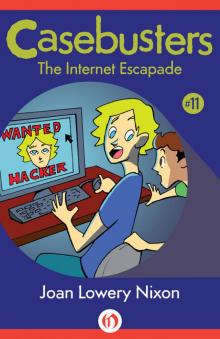 The Internet Escapade
The Internet Escapade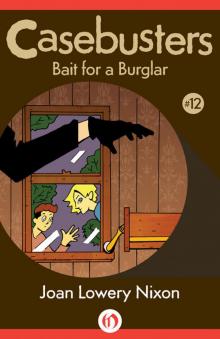 Bait for a Burglar
Bait for a Burglar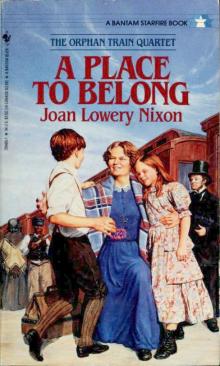 A Place to Belong
A Place to Belong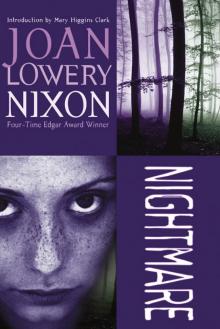 Nightmare
Nightmare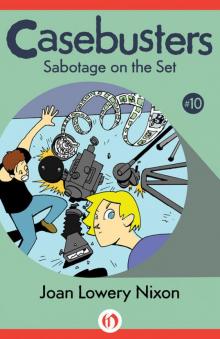 Sabotage on the Set
Sabotage on the Set The Other Side of Dark
The Other Side of Dark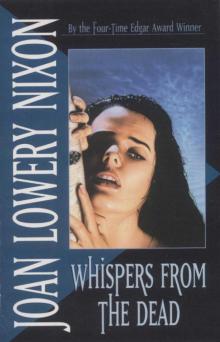 Whispers from the Dead
Whispers from the Dead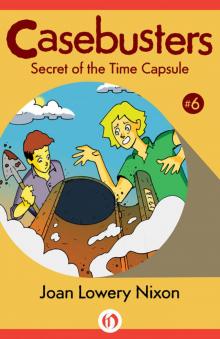 Secret of the Time Capsule
Secret of the Time Capsule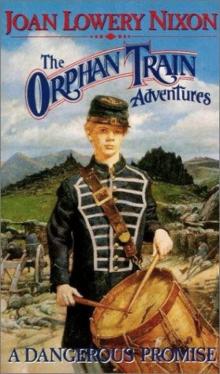 A Dangerous Promise
A Dangerous Promise Laugh Till You Cry
Laugh Till You Cry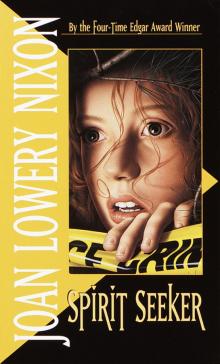 Spirit Seeker
Spirit Seeker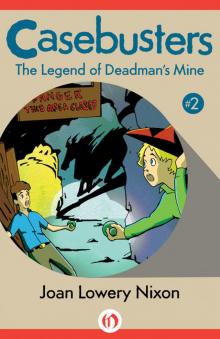 The Legend of Deadman's Mine
The Legend of Deadman's Mine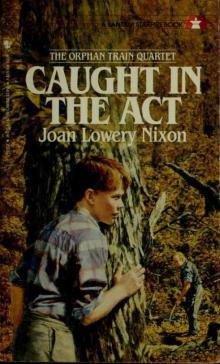 Caught in the Act
Caught in the Act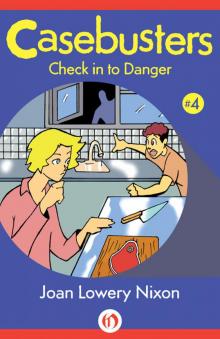 Check in to Danger
Check in to Danger Ellis Island: Three Novels
Ellis Island: Three Novels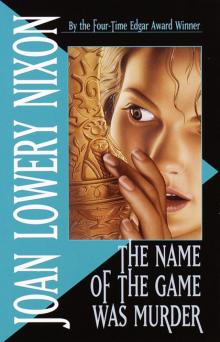 The Name of the Game Was Murder
The Name of the Game Was Murder The Haunting
The Haunting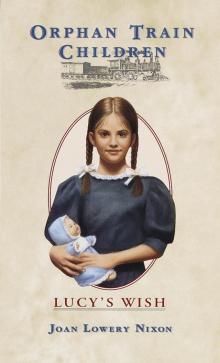 Lucy’s Wish
Lucy’s Wish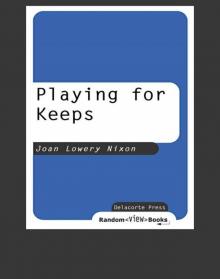 Playing for Keeps
Playing for Keeps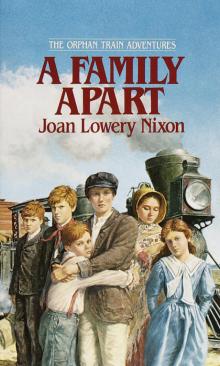 A Family Apart
A Family Apart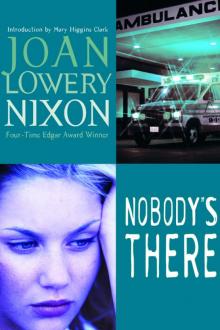 Nobody's There
Nobody's There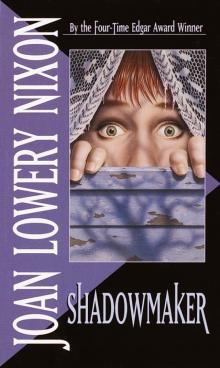 Shadowmaker
Shadowmaker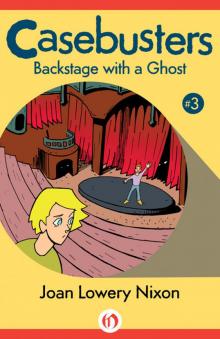 Backstage with a Ghost
Backstage with a Ghost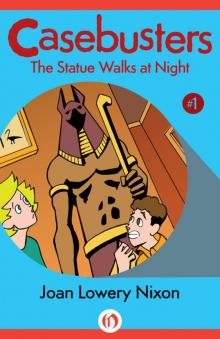 The Statue Walks at Night
The Statue Walks at Night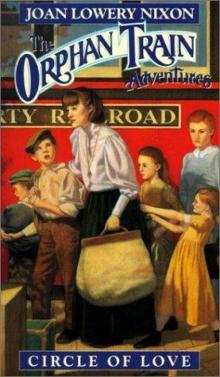 Circle of Love
Circle of Love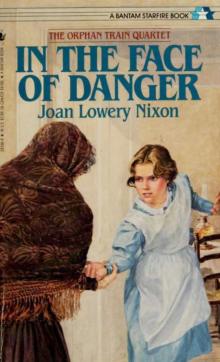 In the Face of Danger
In the Face of Danger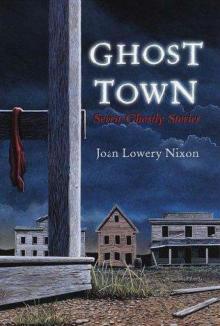 Ghost Town
Ghost Town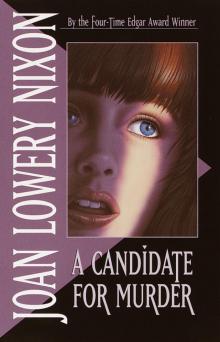 A Candidate for Murder
A Candidate for Murder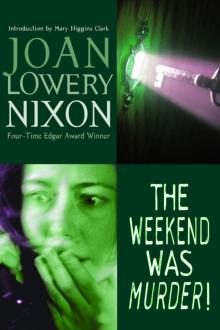 The Weekend Was Murder
The Weekend Was Murder The Island of Dangerous Dreams
The Island of Dangerous Dreams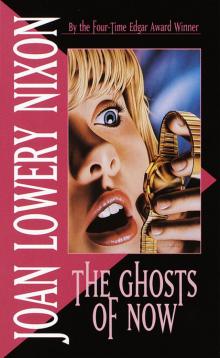 The Ghosts of Now
The Ghosts of Now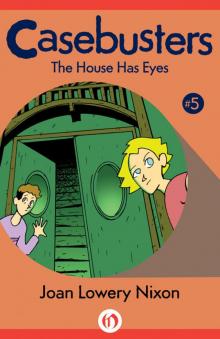 The House Has Eyes
The House Has Eyes The Dark and Deadly Pool
The Dark and Deadly Pool Keeping Secrets
Keeping Secrets Secret, Silent Screams
Secret, Silent Screams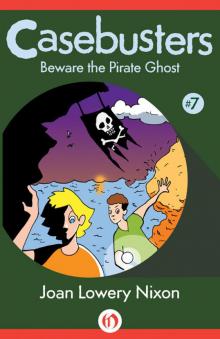 Beware the Pirate Ghost
Beware the Pirate Ghost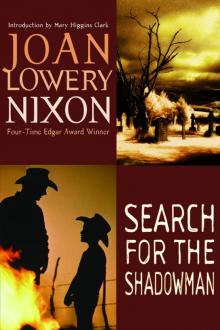 Search for the Shadowman
Search for the Shadowman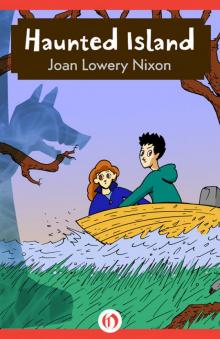 Haunted Island
Haunted Island